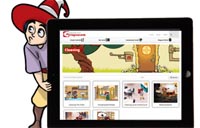The free app, MagnusCards, is used to create e-flashcard decks that serve as easy to understand how-to guides for everyday activities such as cooking, grocery shopping, going to the dentist and picking up prescription medication.
“These multimedia card decks help break down the very common difficulties step-by-step,” says York University Psychology Professor Jonathan Weiss. “There’s a high rate of stress, mental health problems and accessibility issues for people with intellectual disability or autism. Support options like Magnus are important to empower them to manage physical and mental health care.”

According to Magnusmode, the app’s creators, Magnus the wizard who has lost all his magical powers, needs the help of others to do his daily chores. Using decks of e-flashcards in various categories, people with autism or intellectual disability teach Magnus how to manage money, prepare healthy food, take care of personal hygiene, as well as have fun, and along the way, they learn too.
York U team led by Weiss partnered with CAMH, to create a collection of 10 digital card decks focused on health and healthcare, for the MagnusCards app. Scenarios in the card decks include: visiting the eye doctor, the dentist, the emergency department, getting blood work done, going for a health check-up, and dealing with sadness and anxiety.
“These digital card decks help users to visualize and think through scenarios before they occur, decreasing stress and anxiety that can be overwhelming during an appointment,” says Yona Lunsky, clinician scientist at CAMH and co-lead of the project. Card deck topics were selected, based on health services research conducted at York U and CAMH with individuals with developmental disabilities and their families.

“Community research partnerships are important if we are to translate research findings into practical solutions. The more ways we can help people with developmental understand and discuss physical and mental health issues, the healthier they can be,” Lunsky says.
For example, in the card deck about dealing with anxiety, the first card asks, “How do you feel? Is your stomach feeling nauseous or queasy?” The cards progress to more specific questions about the intensity of mood and emotions, and end with a card suggesting how best to get help in such situations.
The idea for MagnusCards is the brainchild of Nadia Hamilton, who was inspired by Troy, her younger brother with autism . “We used to post flashcards around our home to help Troy to complete his tasks, when he was growing up,” says Hamilton, founder & CEO of the social venture Magnusmode. While family support has continued, he faces a lack of external support due to gaps in services for people with cognitive special needs, she points out.
“Thanks to innovative technology, we can create tools that meet the lifelong needs of people with intellectual disabilities. Magnus has the potential to be a companion, tutor, guide, and friend for individuals like my brother,” says Hamilton. The Health card decks can be accessed by creating a free account at magnusmode.com and downloading the MagnusCards app for tablets or smartphones.
The Health card decks initiative was funded by the Canadian Institutes of Health Research (CIHR), in partnership with Health Canada, NeuroDevNet, Autism Speaks Canada, the Sinneave Family Foundation and the Canadian Autism Spectrum Disorders Alliance.


